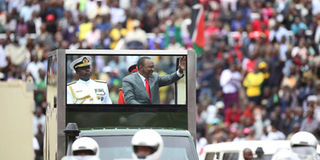Terrorism, graft top list of threats to Kenya: Uhuru

President Uhuru Kenyatta saluting Kenyans when he arrived for Madaraka Day celebrations at Nyayo Stadium on June 1, 2015. He is accompanied Chief of the Kenya Defence Forces Gen Samson Mwathethe. PHOTO | BILLY MUTAI | NATION MEDIA GROUP
What you need to know:
- Among the measures he outlined was a raft of programmes to reduce inequality, better equip the police force and new measures to curb radicalisation.
- The de-radicalisation programme, the President said will heavily rely on the support of parents, religious organisations, civil society organisations, teachers and community leaders.
- He pledged that his administration would bring accountability and ensure that various allegations of corruption involving government officials are followed through.
President Uhuru Kenyatta on Monday announced a new strategy aimed at combating the growth of radicalisation among the youth as a key plank in the war against terrorism.
That was one of the highlights of the Madaraka Day address from Nyayo National Stadium.
Among the measures he outlined was a raft of programmes to reduce inequality, better equip the police force and new measures to curb radicalisation.
“We must accept that we are faced with a new kind of enemy against whom the conventional methods of fighting crime will not work,” he said.
“We have amongst us radicalised youths who appear innocent which makes us believe that they are doing God’s work while they are busy planning evil against other Kenyans in the name of religion.”
He said the biggest enemy the country faced was a radicalised young man or woman who appears innocent but is devoted to death, division and destruction.
“To deal with this enemy, we must keep improving our methods and tactics. Prevention is better than cure, and that is why we must stop them from being radicalised and we can’t do this without the complete cooperation of parents, guardians and religious leaders,” the President said.
The President said that while security agencies have been well equipped to respond quickly to crime, the fight against terrorism still posed the greatest challenge to his administration.
He said the government had strengthened various security agencies including the police, the National Intelligence Services and the criminal investigations department, all of which had led to a considerable reduction in the general crime rate in the country.
RADICALISATION
The de-radicalisation programme, the President said will heavily rely on the support of parents, religious organisations, civil society organisations, teachers and community leaders.
“Together, we can meet our joint duty of vigilance against those who would harm us. The enemy is cunning, but if we work together, we shall overcome.
“I salute those who give information, who voice their suspicions and who stay vigilant for the sake of our security and safety because in doing so you have saved lives,” he said.
Uganda President Yoweri Museveni, who also attended the celebrations, said Kenya and Uganda were working closely in the war against Al-Shabaab.
“They have been defeated if they cannot face the armed forces but only attack civilians who have nothing to do with politics,” Mr Museveni said.
He said the war on terrorism required the “jigger approach”. Rather than cut off a leg to deal with the itch caused by a jigger, the best approach was to use a needle to remove the jigger and leave the leg intact.
He said the attack on Garissa University College students in April was a sign that Al-Shabaab had run out of options.
Besides security, President Kenyatta also emphasised the actions that must be taken to weed out corruption, which, he said, was still the biggest threat to realising the commitments that the Jubilee administration had made to the electorate.
MAJOR DANGER
“The foremost danger to our republic today is the large number of public officials who have become comfortable with laxity and corruption,” he said.
“I call on every Kenyan, be you in the public sector or private sector, to reflect on the question of upholding the tenets of good governance by removing the culture of bribery, extortion, kickbacks and other conspiracies and contrivances against the public interest,” he said.
He pledged that his administration would bring accountability and ensure that various allegations of corruption involving government officials are followed through.
“The billions we are investing to place the welfare of the wananchi at the front and centre of all national activity is hard-earned money sacrificed by the people for the promotion of their well-being. It must be managed responsibly in a manner that takes each shilling as far as it can go, and brings maximum value to our people,” he said.
While pointing out that mismanagement, waste and theft by public officials were a threat to realising the country’s development agenda, the President reminded civil and public servants that they were holding positions of trust.
“Fighting corruption and restoring integrity has three principal components. The first is by delivering accountability for economic crimes already committed,” he said. “Secondly, by enhancing vigilance and prudence in order to detect and disrupt corruption that is under way. Finally, we must establish a robust framework of making Kenya graft-proof going forward.”
He said that digitizing public records and the migration of public information and services online would take the government closer to an administration of integrity free of corruption.
The President cited IFMIS, the E-citizen Government Digital Payments Platform, E-procurement, the KRA Simba system, E-migration, the Online Transactional Cadaster at the Ministry of Mining, and the digitisation of registries at the Ministry of Lands as measures which are restoring efficiency and credibility to government institutions.
“As a result, the government has created space for the best practices in service delivery to become part of government mandate,” he said.




